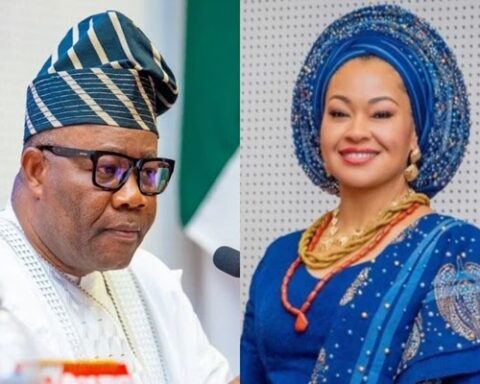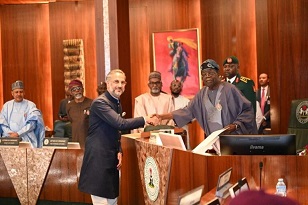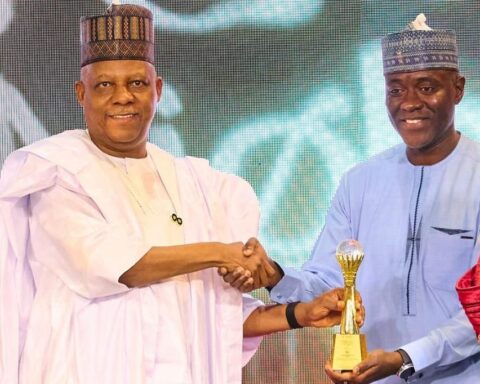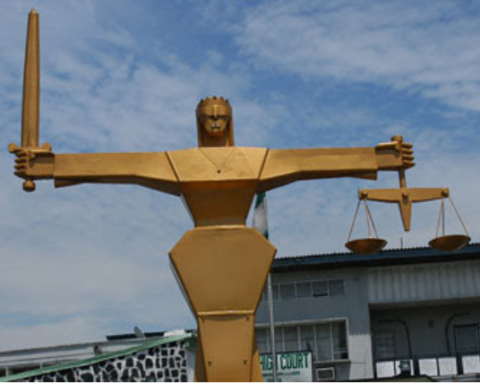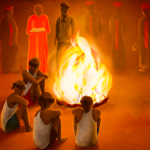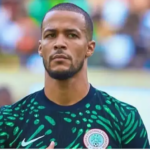By Agbeze Ireke Kalu Onuma,AI-KO
If you sit with me in my hometown of Abiriba or in Lagos where I reside now, and ask me, “What one word best describes you?” – I will smile, pour you a cup of tea, coffee or what suits your taste, and tell you a story. Not because I enjoy dodging questions, but because I have lived six decades across continents, countries, cities, villages and outbacks, through revolutions and quiet sunsets, and I’ve learned that words, no matter how clever, are like trying to catch the wind in your hands. They slip away, leaving only the memory of their touch.
I was born in Abiriba, a small town in Nigeria where the earth stains your feet and the stories of our ancestors are felt everywhere. My father Ụtụ Agba Ịgwọ Abiriba, as strong as an iroko tree, often say, “A man is not a stone. He is the river – always moving, always changing.” Back then, I didn’t understand. I was a boy who wanted simple answers. When elders called me “curious” for pestering everyone around with questions about this or that, or “stubborn” for refusing to let my older brothers win our wrestling matches, I thought those words defined me. But then life stretched me like a drum skin across a wider frame.
At 22, I left Nigeria for the Soviet Union, a strange place, where the cold bit your cheeks and the streets smelled of vodka and burnt bread. I arrived as a scholarship student, wide-eyed and clutching a suitcase full of stuff I quickly realised I wouldn’t need. For 13 years, I watched empires crumble. I stood in Moscow’s Red Square in 1991, breath fogging the air, as the Soviet flag was lowered for the last time. A Russian friend, his voice shaking, muttered, “Everything is changing.” I nodded, but inside, I thought, “Of course it is. Change is the only thing that doesn’t change.”
During those years, I became a patchwork of contradictions. To my Soviet neighbors, I was “the African” – exotic, monkeyish, mysterious, a man who cooked jollof rice with strange spices that made their kitchens smell like a Nigerian marketplace. To my Nigerian friends back home, I was “the one who left,” a man sipping tea in a land where winter nights lasted longer than grief. But who was I, really?
Was I the young man who danced at underground jazz clubs in Moscow, Voronezh, Krasnodar, Sochi and Minsk and many other unknown or hard to remember places, laughing with artists and dissidents? Or the homesick son who knelt by his hostel bed, praying in Igbo for the health of my loved ones, way back home? Was I brave for hoping to build a life in a collapsing empire, or foolish for not fleeing with My friends to the West when the cracks began to show?
So, If you asked me to describe myself in one word, I’d probably laugh. Not because it’s a silly question, but because the idea feels like trying to stuff the ocean into a teacup. How could a single word hold the messiness, the contradictions, the quiet shifts and loud rebellions that make up a person? I’ve spent years collecting words people have thrown at me like confetti – kind, stubborn, quiet, dreamer – but none of them ever stuck. They’d cling for a moment, then flutter away, leaving me still wondering, Okay, but what else?
The first time someone tried to pin me down with a word, I was seven. My teacher wrote “stubborn” on my report card. My mother nodded and said, “Yes, he is, he has even gone out there to disgrace me,” but I remember feeling itchy, like a sweater that didn’t fit. Sure, I rebel when I think adults are overdoing their raising us up to be good kids. But I also once threw a rock at a boy who teased my sister. I wasn’t just stubborn but also sensitive. I was also fierce, and rough. Words, I realized early, were too small for all the things I felt boiling inside me.
Years later, a friend called me “resilient.” We were sitting on a park bench, sharing bananas and groundnuts, and he said it casually, like he was noting the weather. “You’re like Ichita, a native weed that grows through walls and sidewalk cracks,” she said. “Nothing knocks you down for long.” I liked that image – tough, stubborn, rising again. But later, alone, I thought about the nights I’d spent folded over in my room, in the parlour or the kitchen table, head in my hands, wondering if I’d ever figure my life out. Resilient? Maybe. But also scared, uncertain, a little lost. That word didn’t include the cracks, the doubting, the days I didn’t want to get out of bed. It polished me into something heroic, and I’ve never been a hero. Just a person, trying.
Once, during a job interview, a manager squinted at my resume and said, “You’re… adaptable.” He meant it as praise – I’d switched careers a lot, moved cities, learned new stuff on the fly. But adaptability sounds graceful, like a dancer bending into a new shape. What he didn’t see were the nights I lay awake, heart racing, thinking, What if I’m making a mistake? Or the times I white-knuckled through change, pretending to be calm until it felt real. Adaptable? Sure. But also terrified. Excited. Curious. Regretful. All at once.
My grandmother had a different approach. She never used just one word. Instead, she’d tell stories. “Remember when you were five,” she’d say, “and you tried to ‘save’ everyone. Lashing out to protect one person or the other?” Or, “That time you refused to speak to anyone for a week because your best friend moved away to the township?” To her, I wasn’t a label. I was a collection of moments – some brave, some foolish, all mine. When she died, I found various notes in the drawer of my mind where I stored her memories and words and I think I found one that read, “Ekechi: too much heart, not enough sleep.” It wasn’t one word. It was a poem.
Maybe that’s the problem. We’re all poems. You can’t summarize a poem in a word. You can’t capture the rhythm of a life – the verses of joy, the stanzas of grief, the messy, handwritten edits – with something as flimsy as an adjective. I’ve been called “selfless” by someone I helped through a breakup, and “selfish” by friends I left when the friendship was becoming more of a chore and trying wasn’t enough anymore. Both were true, depending on the angle, the light, the day.
I think of myself like the river my father spoke of. In summer, it was gentle, shallow enough to wade through. In raining season, it swelled into something loud and dangerous, swallowing trees. The river didn’t contradict itself. It was simply full of seasons. People are like that. We expand and shrink, freeze and thaw. When my nephew was born, I held him and thought, You’ll be called so many things in your life. He might be “athletic” or “shy” or “funny,” but those words will never touch the way his tiny fist curled around my finger, trusting and fierce, like he already knew the world could be bright and brutal.
A few years ago, my wife and I got into a silly argument about paint colors, just before we moved into our house. For my room, I wanted darker colours on a rough wall; she wanted something brighter. “You’re so… impossible,” she said, rolling her eyes but smiling. I shot back, “And you’re a storm cloud.” We later laughed about it, because we both knew it wasn’t that simple. That same week, I’d worried so much over a missed deadline, convinced my career was over. She had danced in the kitchen when her favorite song came on. We were both clouds and sun, sometimes in the same hour.
I used to envy people who could declare, “I’m an introvert!” or “I’m a free spirit!” with certainty. It sounded cozy, like slipping into a well-worn shoe. But I’ve never fit neatly into any category. At parties, I’m loud with close friends, quiet with strangers. I love spontaneity but make lists for grocery shopping. I’ll argue passionately about a book, then shrug and say, “Eh, maybe I’m wrong.” I’m a walking “but,” a living “however.”
Does this mean we’re indecisive? Unknowable? I don’t think so. It means we’re alive. A single word is a snapshot, but life is a flickering ever rolling film. When I look at old photos, I don’t see a “happy” child or a “confused” teenager. I see layers – a boy grinning, his knees scraped from a fall earlier that day. A teenager scowling, but clutching his friend’s hand.
Maybe the closest I’ve come to a word is “becoming.” Not the polished, finished kind, but the rough, endless kind. A verb, not an adjective. When I was ten, I “became” a reader, hiding under blankets after lights out with a flashlight. At twenty-five, I “became” someone who could apologize first. Last year, I “became” a totally different person who knows but also forgets what he knows. None of these versions cancel the others. They stack, like rings inside a tree.
Language failed me. In Nigeria, I am called “respected” because I occasionally dress well and read a lot of books. In the USSR, I was “Tovarish, comrade” – a word that tasted like metal on my tongue. When the Soviet Union dissolved, splitting into 15 countries overnight, I became a man without a label. Russia, Ukraine, Kazakhstan – these new borders didn’t fit me. I was a tree whose roots now spread across frozen soil and dark African earth.
When I returned to Nigeria at 38, I was no longer just “Abiriba’s son.” My nieces and nephews whispered that I spoke Igbo with a sprinkling of “strange indecipherable words.” Market women clucked their tongues at my habit of wearing socks with sandals, a relic of Russian winters. “You’ve become a stranger,” my sister joked, but her eyes were understanding. You cannot walk through fire and return smelling of rain.
Now, at 60, I often sit on our veranda in Abiriba, watching the sun paint the sky in shades of orange and purple. My wife calls me “steady” because I rise at dawn to pray, as regular as the cock’s crow. My daughter assumes me to be a “storyteller” because I recount tales of Soviet life and trains that smelled of cabbage, and Nigerian festivals where masquerades danced like spirits. My old friends from university, now graying and round-bellied, call me “lucky” for surviving a vanished country. But these words are fragments, pieces of a mosaic no one sees in full.
How could one word hold the boy who swam in the River Ayo, in Awkunanaw Enugu, and nearly drowned at 13, the student who memorized Pushkin’s poems to impress a Russian girl, the father who wasn’t there for her daughters birth but couldn’t hold back the tear of joy when I finally did see and hold her years later? How could it hold the nights I shivered in a Moscow apartment, listening to gunfire during the coup, or the pride I felt building my first house in Lagos, brick by brick, with my wifes’ hands beside mine?
People have tried to name me. A professor once called me “scatterbrain” during a lecture. A Nigerian soldier in a short course I met on a train during the Soviet collapse called me “unshakeable.” My wife, on our anniversary, called me “Obim… My heart.” All these words are true, but none are complete. Like the moon, I have phases. Some days, I am the stern elder, scolding children. Other days, I am the wide-eyed dreamer, scribbling poems in the margins of newspapers.
Abiriba taught me that a man is his history. The Soviet Union confirmed what my Father taught me that history is a river, carving new paths without asking permission. When I walk through my town now, past Ọkpụ Achị and I see the women at Orieakwa, I see my life reflected in fragments. The stubbornness of my father lives in my clenched jaw when I argue politics. The resilience of my mother, who buried three children and still sang hymns every morning, lives in my hands, which have rebuilt homes, friendships, and faith after losses I once thought would break me.
Perhaps this is why we Igbos love proverbs. We don’t pretend to explain everything. “A man who carries a basket of water has nothing to offer,” my uncle Odim used to say. Meaning: Don’t reduce what cannot be contained. When my Russian friends asked me, “What is Nigeria like?” I didn’t say “hot” or “chaotic.” I told them about the Harmattan winds that turn the sky gold, and the way my people argue for hours over whose goat ate whose yam, then share a pot of soup made from that same goat like brothers.
Years ago, during a bitter Moscow winter, I met a Georgian poet in a dimly lit café. He’d survived Stalin’s purges, and his face was a map of wrinkles and sorrow. When I asked him how he endured, he sighed and said, “I stopped trying to be one thing. A man is a forest – many trees, some dead, some growing, all rooted in the same soil.” At the time, I thought he was drunk on cheap Gruzinsky cognac. Now, I think he was the wisest man I ever met.
My daughter asked me not long ago, “Daddy, are you more at home as a Nigerian or Russian?” I chuckled and said, “Yes.” She frowned, confused. But how else could I answer? I drink tea, a habit I imbibed in Russia and cuss in Igbo when the power cuts out. I also miss the taste of black bread, chisnok [garlic] and saltfish and the way snow muffled the sounds of the world, as if God had pressed a finger to His lips. I am not bicultural. I am a stew – ingredients simmered into something new, something that can’t be picked apart but best enjoyed whole.
This is why labels itch. When doctors mark me “male, 60,” they don’t see the child who carried his sister on his back during monsoon rains, or the man who kissed his wife for the first time with his eyes wide open. When forms ask for my nationality, I check “Nigerian,” but my heart whispers, Abiriba, Moscow, Kiev, Minsk, Voronezh, Krasnodar, Sochi, Budapest, Gdansk, Istanbul, Item, Igbere, survivor, teacher, fool, husband, father, brother, uncle, son and what else?
Maybe this is what my father meant about the river. Water doesn’t argue with its shape. It bends around rocks, carves canyons, floods plains, and retreats. It is never only one thing. When I look in the mirror now, I see a face weathered by African suns and Slavic blizzards. I see a man who has been called “foreigner” in many languages, who has buried friends on three continents, who still hums Soviet folk and classical songs while thinking or just so.
So, ask me again: What one word best describes you?
I will hand you a palm frond and say, “Weave this into a single thread.” When you can’t, I’ll smile and tell you about the day I stood on the Asaba end of the Niger River’s bank as a man, tossing a pebble into the water. My long departed father’s voice whispered and said, “Why do you bother? The river doesn’t care.” But I wasn’t throwing it for the river. I was throwing it for the ripples – the way they spread, endless, until they touched the shore and vanished.
We are all ripples. Born from stones we didn’t choose, shaped by currents we can’t control, reaching farther than any word could trace. Call me old. Call me Nigerian. Call me a man who loved and lost and learned. Call me anything, the probability is that I must have been that albeit fleetingly. But don’t insult me with a single word. My life deserves a library.
So, what’s the one word that describes me? None. And all of them. I’m a collage of what I’ve been and what I’m still growing into. Call me “contradiction” or “work-in-progress.” Call me “human.” But don’t expect me to stay in the lines. The best parts of us spill over, messy and glorious, refusing to be named.
©️AI-KO

